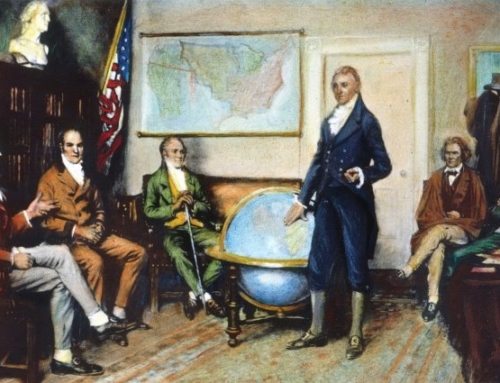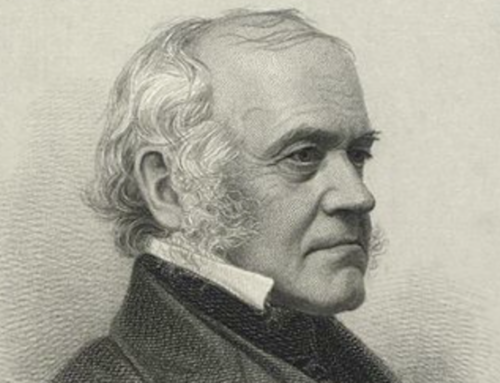I have been asked to speak just a bit about my position as the second holder of the titles Scholar in Residence and Visiting Scholar of Conservative Thought and Policy. Two weeks ago, my college roommate and still one of my closest friends, asked me what it felt like to be entering a place with CONSERVATIVE tattooed on my forehead.
He knows me well, and he also knows from our first conversations in the fall of 1986 (our first semester in college) that I despise labels. I always have, and I probably always will. Almost all labels, even well-intended ones, tend to allow us to categorize one another, to consider one aspect of an extremely (incomprehensibly) complex person as the sum total of that person, or, when not well-intended, to dismiss another—more often than not in history because of the accidents of birth. Regardless of intent, labels almost always diminish rather than elevate.
But, here I am bearing the mark of “Conservative” in one of the two titles bestowed on me by the University of Colorado-Boulder. Perhaps it is emblazoned in neon or mere ink. I am not sure. And I do bear the title proudly. And why not? I have a great job, I am surrounded by amazing people endowed with seemingly limitless amounts of energy, and I am speaking in what is arguably one of the prettiest spots in all North America, if not the world.
But, what about that label, “conservative”? Well, let me explain—as I see it—what a conservative is NOT.
- A real conservative is not a loud, platinized, remade and plastically remolded talking head on Fox.
- A real conservative is not that guy on the radio who seems to hate everything and everyone.
- And, a real conservative never wants to bomb another people “back to the stone age.”
My own tradition of conservatism—whether I live up to it or do it justice—is one that is, for all intents and purposes, humanist. I believe there is a line of continuity from Heraclitus to Socrates to Zeno to Cicero to Virgil to St. John to St. Augustine to the Venerable Bede, Alcuin, and the Beowulf poet, to Thomas Aquinas to Petrach to Thomas More to Edmund Burke. The last one hundred years saw a fierce and mighty revival of the humanist tradition, embracing and unifying (more or less) T.E. Hulme, Paul Elmer More, Irving Babbitt, Willa Cather, G.K. Chesterton, Christopher Dawson, Sigrid Unset, Nicholas Berdayeev, Sister Madeleva Wolff, T.S. Eliot, Romano Guardini, Dorothy Day, Gabriel Marcel, Jacques Maritain, Etienne Gilson, J.R.R. Tolkien, C.S. Lewis, Leo Strauss, Flannery O’Connor, and Russell Kirk, to name a few.
George Orwell, both shocked and impressed by the movement, noted in December 1943 that it was nothing more than neo-reactionary: a strange mix of traditionalism in poetry and literature, religious orthodoxy in ethics, and anarchy in politics and economics. I must admit, though I have never called myself a neo-reactionary, almost all those who Orwell reluctantly admired are certainly heroes of mine.
But as I see it, the conservative or humanist—or, the conservative humanist, if you will—only possesses one job and one duty, when all is said and done, and she or he performs it to the best of her or his ability: A conservative attempts to conserve what is most humane in all spheres of life: in economics, in education, in the military, in the culture, in faith, in business, in government, and in community. The conservative is, at the most fundamental level, a humanist, reminding each and every one of us what it means to be human.
And, empirically, we can state that the record of humanity over the last 100 years (considering that this is the 100th anniversary of the outbreak of World War I, it is a fitting time to announce the beginning of our own “time of troubles” as Kirk liked to argue) is rather mixed.
Think of several persons over the past one hundred years:
- Perhaps you are a Japanese-American watching the California business and home of your parents auctioned off as you and your family are forcibly removed to the deserts of Idaho, under the sanction of Executive Order 9066 from the U.S. President.
- Or, perhaps you are in the second row of Carnegie Hall, listening to Miles Davis perform “Teo” in 1961.
- Or, perhaps you are a nurse on the early morning shift at the Shima Medical Facility on August 6, 1945. Little do you know that at any moment the wind will increase to 600 mph and the heat to 4,000 degrees Fahrenheit—all stamped with “Made in America” across them.
- Or, could you are lounging on the couch in pure leisure with a wealthy Tennessee couple, as a young handicapped Georgian reads her latest story, “The Misfit.”
- Or, perhaps you might be overwhelmed by the smell of bodies, alive, dead, and somewhere in-between, as a railway car carries you to a supposed “health resort” in semi-rural Poland.
- Or, perhaps, you are sitting next to a young man from St. Louis in an Irving Babbitt seminar at Harvard, the young man—you, like everybody else, calls him “Old Tom”—is joking about poems about cooking eggs, hippos, and waste lands.
- Or, perhaps, you are holding hands with hundreds of others, signing a hymn after Sunday service, facing very angry-looking armed men with water cannons and attack dogs, hungering to “put you in your place.”
- Perhaps, you’ve just escaped from the hell that is Pol Pot’s Cambodia, made it to America to resume not only a medical practice but even begin an acting career. Perhaps you have even won the Academy Award for Best Actor, 1985, only to be gunned down on the driveway in an LA gang slaying.
- Perhaps you are holding your breath as the third movement ends and you anticipate the fourth as a five-hundred person choir in Bloomington, Indiana, along with a full orchestra pays homage to an early nineteenth-century, German composer.
- Or, maybe it is not all that dramatic, at least in terms of world-changing events. Perhaps you have simply come home to the happy exclamations of children, rushing to you to tell you of the day and assume—quite rightly—that you will hug them with all the love that is in you.
This is humanity. This is the human condition. The tragic, the noble, the accidental, the willful, the good, the evil, the true, the false, the ugly, and the beautiful. Each one of us in existence is unique in time and space, clothed with particular ethnicities, languages, religious faiths, and a million other things. Yet, however different, each person is connected to every other person, from the beginning of time to the very end.
This continuity, this universal quality of human existence, is a blessing, pure and simple. When we speak, we speak not just to our neighbor, but to Socrates, and he to us. When we speak, we speak to our children and our grandchildren and their grandchildren. What Perpetua did in the Roman area or Thomas More in the courts of Henry VIII does not become trapped only in that time and place, but resonates across, through, over, below, and next to the ages.
In a spirit of overwhelming gratitude, the humanist looks out upon the world, sighs in frustration at the horrors of the past, and cautiously anticipates what good can come next. In our first duty—the duty to be human, we must be humane. We must love, and we must cherish. We must, when warranted, give thanks. We must celebrate creativity and peace.
This essay is a modified version of a talk delivered on August 20, 2014, for the Sewall Academic Residential Program, at the University of Colorado-Boulder.
The Imaginative Conservative applies the principle of appreciation to the discussion of culture and politics—we approach dialogue with magnanimity rather than with mere civility. Will you help us remain a refreshing oasis in the increasingly contentious arena of modern discourse? Please consider donating now.








Nice piece, Brad. There are many types of conservative humanists. Your list is extensive, but it neglects Lynn Harold Hough, and Bernard Iddings Bell, and others.
Not a single industrialist or entrepreneur on the list. I know Conservatives are wary of corporatism, but you could have managed a Ford or a Gates up there.
“She or he”? That’s not conservatism. That’s capitulation. We don’t have to go that far just yet, and when we do, articles like this won’t win any converts.
I’m to to sure about Socrates speaking to us, he and Plato had a rather fuzzy & paternalistic conception of what the State was or should be. Interesting reading and I admit a long time ago, but I’ll stick with the Founding Fathers and the Federalist Papers. A legacy granted but one squandered.
You bring up “religious orthodoxy in ethics” as a conservative tenet without comment here. And in a blog post less than a month ago (https://theimaginativeconservative.org/2014/08/christian-statement-liberal-arts-virtue.html), you emphasized a position that a liberal arts education should teach students Christian dogma:
“The teaching and inculcating of virtue-rooted in and derived from the Judeo-Christian understanding of the Natural Law-should be the purpose of a liberal arts education….
“Our society must recognize that the only real alternative to the follies of the twentieth century is a return to the liberal arts, the teaching of virtue, and an acknowledgement of the profundity of the Incarnation, the Death, and Resurrection of Christ….
“Our mission should be to return education to right reason, first principles, and true justice. Indeed, a liberal arts education teaches men and women that they are made in the Image of the Creator, flawed, but redeemed by Eternity entering Time, the Incarnation, His death, and His resurrection.”
But of course atrocities and injustices have been committed over the centuries by followers of Jesus also, including the Crusades, the Inquisition, countless other religious wars, and the denial of equal human rights to women or those of other races, faiths and orientations.
Researcher Stephen Pinker notes that violence and religion have often gone together and that violence has been on the wane worldwide for centuries while religions become more liberal and less influential when contrasted with reason and science. Of course intolerant secular societies have also demonstrated an enormous capacity for violence, especially in the 20th century, so perhaps part of the key to violence is dogma and intolerance.
So why do you try to conserve religious dogmas of the past and promote them as an essential part of a liberal arts education, when it seems more likely to lead to intolerance, violence and inhumanity than the more modern scientific trends that are actually correlated with more peace?
Do you plan to promote a dogmatic Christian approach as fundamental to a liberal arts education while at CU?